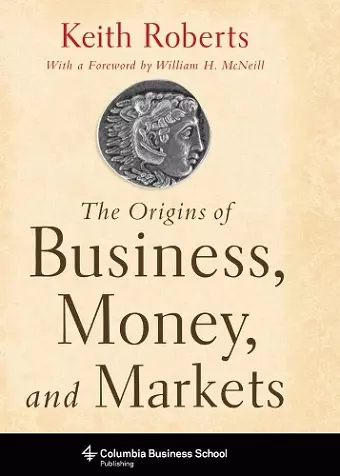The Origins of Business, Money, and Markets
Format:Paperback
Publisher:Columbia University Press
Published:3rd Mar '15
Should be back in stock very soon

Knowing and understanding Western business history helps clarify the nature of business throughout the world today, along with the public policies that determine much of its current operating environment. Yet rarely do business historians look further back than the European Middle Ages. As Keith Roberts describes in this book, business, markets, and money as we know them took shape in the ancient Greek, Hellenistic, and Roman civilizations. His detailed history underscores the parallels between early and modern business practice. With its broad consideration of business morality, the nature of wealth, the role of finance, and the development of public institutions that shaped business possibilities, Roberts pioneers an absorbing account of a long neglected history.
To understand business and its political, cultural, and economic context, it helps to view it historically, yet most business histories look no further back than the nineteenth century. The full sweep of business history actually begins much earlier, with the initial cities of Mesopotamia. In the first book to describe and explain these origins, Roberts depicts the society of ancient traders and consumers, tracing the roots of modern business and underscoring the relationship between early and modern business practice. Roberts's narrative begins before business, which he defines as selling to voluntary buyers at a profit. Before business, he shows, the material conditions and concepts for the pursuit of profit did not exist, even though trade and manufacturing took place. The earliest business, he suggests, arose with the long distance trade of early Mesopotamia, and expanded into retail, manufacturing and finance in these command economies, culminating in the Middle Eastern empires. (Part One) But it was the largely independent rise of business, money, and markets in classical Greece that produced business much as we know it. Alexander the Great's conquests and the societies that his successors created in their kingdoms brought a version of this system to the old Middle Eastern empires, and beyond. (Part Two) At Rome this entrepreneurial market system gained important new features, including business corporations, public contracting, and even shopping malls. The story concludes with the sharp decline of business after the 3rd century CE. (Part Three) In each part, Roberts portrays the major new types of business coming into existence. He weaves these descriptions into a narrative of how the prevailing political, economic, and social culture shaped the nature and importance of business and the status, wealth, and treatment of business people. Throughout, the discussion indicates how much (and how little) business has changed, provides a clear picture of what business actually is, presents a model for understanding the social impact of business as a whole, and yields stimulating insights for public policy today.
Keith Roberts knows his history and is highly informed on the nature of today's comparable instruments and institutions. By placing his story within changing political, social, and cultural settings and by presenting it in a fascinating, well-written way unencumbered by technical jargon, he opens a new field in the discipline of business history. -- Alfred D. Chandler, emeritus, Harvard Business School, and winner of the Pulitzer Prize and the Bancroft Prize for history Business history has largely ignored the ancient world, while in fact there is considerable evidence that business played an important in it. This book provides an accessible, well written validation of this argument. -- Karl Moore, Desautels Faculty of Management, McGill University An excellent book. Booklist Roberts's well-documented, readable book provides valuable insight into the past and lessons for the present...highly recommended. Choice
ISBN: 9780231153270
Dimensions: unknown
Weight: unknown
368 pages